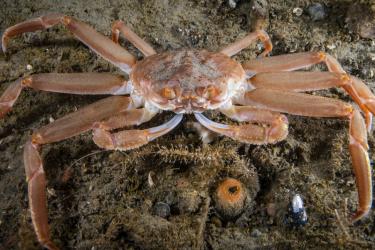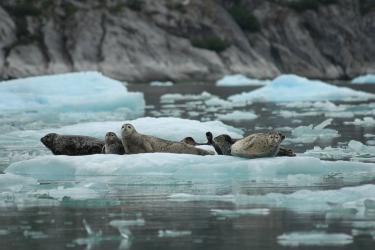
A killer whale breaching.
Stock Assessment
Resource managers need to know how many whales there are, where they are, and how their populations are changing. Our scientists estimate the abundance of killer whales by directly counting individual animals matched with our photo-identification catalog. We present this information in annual stock assessment reports.

Satellite Tagging
We are participating in a satellite tagging project to more accurately assess the range of West Coast transient killer whales. This research will also help determine the impacts on local prey populations based on the amount of time the whales spent in each area. This project is a collaborative effort with the Northwest Fisheries Science Center, Cascadia Research Collective, and the University of Alaska.
Acoustic Research
Together with our research partners we collected digital audio recordings of transient killer whales to investigate the population structure of transient killer whales in Alaska. The study revealed at least three acoustically and genetically distinct sub-populations in western Alaska. Using these data we have begun to catalogue the regional vocal repertoires of transient killer whale call types in Alaska.

We are investigating the potential role of killer whales in the continued decline of the western stock of Steller sea lions in Alaska. Our scientists are analyzing the diets of the western stock transient killer whales compared to the eastern stock. We have deployed passive acoustic recorders near Steller sea lion rookeries to record when killer whales are in the vicinity and listen for attacks on sea lions. We are deploying satellite-linked depth tags on transient killer whales to determine if they are diving to depths consistent with predation on squid. Resident whales have also been tagged to evaluate their possible role as competitors for food with Steller sea lions.
* All photos were taken under research permit.



